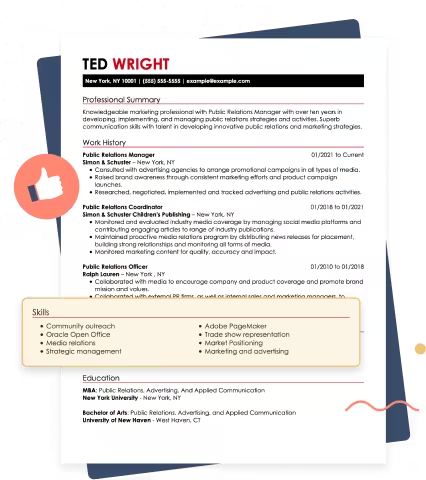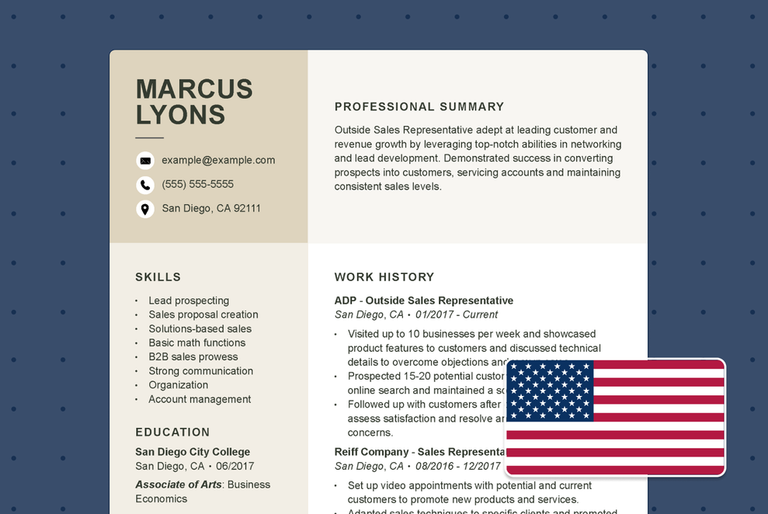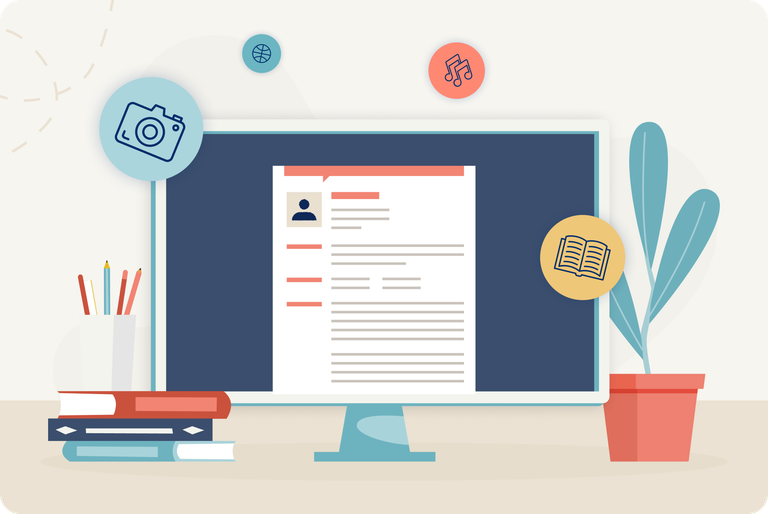Our customers have been hired at: *Foot Note
Whether you are a high school or college student, a recent graduate, a seasoned professional, or looking to make a career change, understanding and developing transferable skills is essential in today's evolving and competitive job market.
Most jobs require technical skills like proficiency in medical imaging software in radiology or programming language skills in software engineering. However, employers also look for agile and adaptable candidates with a broad range of transferable skills, such as problem-solving and active listening.
Here, we will examine transferable skills and why they are vital in the modern workplace.
Jump to the following sections:
- What are transferable skills?
- Transferable skills by job title
- How to identify your transferable skills
- Emphasizing transferable skills on your resume
- Resume examples with transferable skills
- Transferable skills in your cover letter
- Leverage transferable skills in a job interview
- How to develop transferable skills
What Are Transferable Skills?
Transferable skills, also known as portable skills, are abilities and traits that can be applied to any job or industry and are, therefore, highly valuable, especially if you don’t have work experience in a particular industry. They include hard skills like writing and Microsoft Office and soft skills like teamwork and communication.
Why are transferable skills important?
Employers look for applicants with transferable skills as they demonstrate adaptability, resilience, and versatility, which are significant in our rapidly changing job market. Transferable skills allow you to easily pivot between different roles and industries and are essential for career growth and advancement.
Example transferable skills for your resume
The following transferable skills list includes some of the most highly sought-after skills in today’s job market.
- Communication
- Effectively conveying information, ideas, and feedback.
- Leadership
- Inspiring and guiding others toward a common goal.
- Time management
- Prioritizing tasks and meeting deadlines efficiently.
- Adaptability
- Being flexible and open to change in dynamic environments.
- Teamwork
- Collaborating with others to achieve shared objectives.
- Project management
- Planning, executing, and overseeing projects from start to finish.
- Negotiation
- Reaching mutually beneficial agreements through discussion and compromise.
- Creativity
- Thinking inventively to develop new ideas or solutions.
- Data analysis
- Interpreting data to draw meaningful insights for decision-making.
- Emotional intelligence
- Understanding and managing one's emotions and those of others.
- Networking
- Building relationships with colleagues, clients, or industry contacts for mutual benefit.
- Research skills
- Gathering information from various sources for informed decision-making.
- Conflict resolution
- Resolving disagreements or disputes in a fair and constructive manner.
- Presentation skills
- Delivering information effectively through verbal or visual means.
Transferable skills like communication, leadership and critical thinking are crucial for almost any job. That’s why it’s important to include them and highlight any tasks or projects where you demonstrated these skills.
Transferable Skills by Job Title
Understanding and highlighting these versatile skills can significantly enhance your employability and career prospects.
Transferable skills are essential for a competitive resume because they:
- Enable you to work effectively with a broad range of people.
- Demonstrate your ability to learn quickly.
- Make you well-rounded.
- Provide opportunities for you to learn and grow in your job.
We’ve compiled a list of top job titles and matched them with examples of transferable skills employers look for in those professions, below:
- Teacher:
- Communication: Effectively conveying information to students, parents, and colleagues.
- Cultural competence: Adjusting teaching methods to meet the needs of diverse learners.
- Leadership: Inspiring and guiding students toward academic success.
- Problem-solving: Addressing challenges in the classroom and finding solutions to enhance learning.
- Decision-making: Making decisions that affect other people and being able to alter decisions as needed.
- Registered nurse:
- Interpersonal: Effectively communicating with patients, families, and healthcare team members.
- Critical thinking: Evaluating patient needs and making quick decisions in emergencies.
- Emotional intelligence: Providing compassionate care and supporting patients through difficult times.
- Adaptability: Flexibility in responding to changing patient conditions and health care protocols.
- Teamwork: Collaborating with other health care professionals to deliver comprehensive patient care.
- Accountant:
- Attention to detail: Ensuring accuracy in financial records and reports.
- Analytical skills: Interpreting financial data and identifying trends or discrepancies.
- Problem-solving: Resolving financial issues and optimizing financial processes.
- Ethics: Reporting financial data accurately and honestly.
- Math: Interpreting data, balancing accounts, and preparing accurate financial reports.
- Administrative assistant:
- Organizational skills: Managing schedules, appointments, and office tasks efficiently.
- Communication: Interacting with clients, colleagues, and vendors professionally.
- Time management: Prioritizing tasks and meeting deadlines in a fast-paced environment.
- Attention to detail: Ensuring accuracy in data entry, document preparation, and correspondence.
- Multitasking: Handling multiple projects or tasks at the same time.
- Pharmacist:
- Attention to detail: Dispensing medications accurately and ensuring patient safety.
- Customer service: Providing personalized care and addressing patient concerns.
- Analytical: Interpreting prescriptions and monitoring drug interactions.
- Verbal communication: Explaining medication instructions and counseling patients on proper usage.
- Financial literacy: Processing insurance claims and taking payments from customers.
- Cashier:
- Conflict resolution: De-escalating various situations with customers and colleagues while remaining calm.
- Efficiency: Handling transactions quickly and accurately during peak hours.
- Attention to detail: Ensuring accuracy in processing payments and maintaining inventory.
- Customer service: Addressing customer inquiries and resolving issues in a friendly manner.
- Cash handling: Ensuring accurate calculations of varying sums of money.
- Retail manager:
- Leadership: Managing and motivating a team to achieve sales targets and provide excellent customer service.
- Problem-solving: Addressing operational challenges and finding solutions to improve store performance.
- Communication: Effectively conveying expectations and feedback to staff and stakeholders.
- Patience: Being able to handle varying customer demands and staff needs.
- Composure: Remaining calm under pressure.
- Cook:
- Creativity: Developing new recipes and innovative dishes to enhance menus.
- Time management: Coordinating food preparation to ensure timely service.
- Attention to detail: Maintaining quality standards in food presentation and taste.
- Teamwork: Collaborating with kitchen staff to ensure smooth operations.
- Adaptability: Adjusting to changing ingredients or menu requirements based on customer feedback.
- Stress management: Ability to remain calm and focused in high-stress environments.
- Customer service representative:
- Communication: Interacting with customers through various channels to address inquiries and concerns.
- Problem-solving: Resolving customer issues and finding solutions to meet their needs.
- Emotional intelligence: Understanding and empathizing with customer emotions to provide effective support.
- Adaptability: Handling diverse customer personalities and situations with professionalism.
- Time management: Managing multiple customer interactions efficiently while maintaining service quality.
- Nanny:
- Communication: Building rapport with children and parents to ensure effective care and communication.
- Creativity: Engaging children in educational and fun activities to promote development.
- Patience: Handling challenging behaviors and situations with calmness and understanding.
- Organizational skills: Planning and managing daily routines and activities for children.
- Flexibility: Adjusting caregiving approaches based on children's needs and preferences.
- Carpenter:
- Problem-solving: Identifying issues with construction projects and finding practical solutions.
- Attention to detail: Ensuring precision and accuracy in measurements and craftsmanship.
- Collaboration: Working well with a variety of people on a team.
- Time management: Efficiently organizing tasks to meet project deadlines.
- Desire to learn: Keeping current on new technology and trends in the construction industry.
- Project Manager:
- Leadership: Guiding and motivating team members to achieve project goals.
- Communication: Clearly articulating project objectives and expectations to stakeholders.
- Time management: Planning and scheduling project tasks to ensure timely completion.
- Problem-solving: Addressing challenges and obstacles that arise during project execution.
- Adaptability: Flexibility in adjusting project plans based on changing circumstances.
- Software Engineer:
- Problem-solving: Analyzing complex technical issues and developing innovative solutions.
- Critical thinking: Evaluating software design and architecture to optimize performance.
- Autonomy: Operating and making decisions independently.
- Continuous learning: Keeping up to date with new technologies and programming languages.
- Troubleshooting: Trying different approaches to solve a variety of issues as they arise.
- Web Developer:
- Creativity: Designing visually appealing and user-friendly websites.
- Attention to detail: Ensuring accuracy in coding and testing website functionality.
- Computer skills: Keeping up with evolving web development trends and technologies.
- Relationship-building: Establishing and maintaining relationships with colleagues and clients.
- Problem-solving: Troubleshooting and debugging issues in website development.
- Writer:
- Creativity: Generating engaging and original content for various mediums.
- Written communication: Expressing ideas and concepts clearly and effectively through writing.
- Research: Conducting thorough research to gather information for writing projects.
- Curiosity: Being interested in many different topics.
- Persuasion: Being able to convince people to do or believe something.
How to Identify Your Transferable Skills
Before using your transferable skills in your resume and cover letter, you need to identify them. Reflect on past tasks and projects and analyze the skills that led you to success. For example, you may have developed strong communication and problem-solving skills working in customer service.
Similarly, if you have held leadership positions in student organizations or volunteer groups, you likely possess skills in team management, decision-making, and conflict resolution.
You can also identify your transferable skills by getting feedback from colleagues, supervisors, or mentors who can provide insights into your strengths. Additionally, consider taking online assessments or career quizzes to help you identify your key strengths and transferable skills.
Emphasizing Transferable Skills in Your Resume
Customize your resume to your target role by reading the description closely and highlighting the skills that match your proficiencies. If you don’t have experience in the field and lack the required technical skills, then focus on your transferable skills.
For example, if you are a human resources manager applying for a position as a business operations manager, you might highlight these transferable skills:
- Leadership
- Management
- Verbal and written communication
- Strategy
- Research
- Budgeting
- Knowledge of business processes
- Interpersonal skills
When updating or writing your resume, display your transferable skills in each section and make them stand out by showing how you have used them.
Here is a breakdown of how to emphasize transferable skills in each section of your resume:
1. Professional summary or objective statement
Your summary or objective statement is your opportunity to tell hiring managers why you are a viable candidate for the job you want. Introduce yourself and focus on transferable skills that are relevant to the position.
For example, if you are a seasoned home health aide and you are applying for a job as a nursing assistant, you might write a resume objective that stresses your related work experience and relationship-building, teamwork, empathy, and conscientiousness. Summarize your job qualifications and goals in a resume like so:
"Compassionate home health aide with extensive experience in personalized patient care. Skilled in daily living assistance, medication management, and vital sign monitoring. Proven ability to establish rapport with patients, collaborate with health care teams, and ensure the highest level of comfort and well-being for those under my care."
2. Skills section
Create a dedicated skills section on your resume where you list out your transferable skills in bullet points. Include both hard skills (e.g., software proficiency, language fluency) and soft skills (e.g., negotiation, resilience) that apply to the job requirements.
Here's an example of skills to list as a sales manager, including hard, soft, and transferable skills:
Skills:
- Leadership
- Communication
- Data analysis
- Adaptability
- Negotiation skills
- CRM proficiency
- Strategic planning
3. Work experience section
When describing your work experience, use specific examples to demonstrate how you have applied your transferable skills in previous roles. Highlight achievements that showcase your ability to successfully transfer skills from one job to another, such as leading cross-functional teams or implementing process improvements.
For example, a personal trainer applying for a job as a wellness director might add the following to their work experience section:
- "Increased client retention rate by 20% through personalized training programs and effective communication, improving client satisfaction and loyalty to the fitness center."
- "Led a team of trainers to achieve a 15% increase in overall gym membership sales by implementing targeted marketing strategies and providing exceptional customer service, showcasing leadership and sales skills."
- "Developed and implemented a wellness program that resulted in a 10% decrease in employee absenteeism and a 15% increase in employee morale, demonstrating strong program development and employee engagement skills."
4. Education section
In the education section of your resume, mention any coursework, projects, or extracurricular activities that have helped you develop transferable skills relevant to your target job. Emphasize relevant certifications or training programs that have enhanced your skill set and prepared you for diverse roles.
For example:
Education
Bachelor of Science in Business Administration
XYZ University, Brattleboro, VT
Expected Graduation: May 2025
Relevant Coursework:
- Business Communication: Developed strong written and verbal communication skills through presentations, reports, and group projects.
- Marketing Principles: Acquired skills in market research, strategic planning, and customer relationship management.
- Organizational Behavior: Enhanced teamwork, leadership, and conflict resolution skills through group discussions and case studies.
The above sample resume education section highlights the student's academic achievements and emphasizes the transferable skills gained through coursework that can be applied to various professional settings.
5. Optional sections
Include additional sections on your resume, such as volunteer experience or professional development, to further showcase your transferable skills. Describe how these experiences have helped you develop valuable skills in various contexts and emphasize achievements whenever possible.
For example, a former security guard applying for their first role as a police officer might include a volunteer section like the following:
Community Patrol Volunteer
Local Neighborhood Watch Program
Sioux Falls, SD
September 2023 - January 2025
- Patrolled designated areas to ensure the safety and security of residents.
- Assisted in reporting suspicious activities and potential security threats to local law enforcement.
- Participated in community outreach events to promote crime prevention and safety awareness.
- Collaborated with fellow volunteers to coordinate neighborhood watch meetings and training sessions.
Once you’ve identified your skills, you can start working on your resume using our Resume Builder.
Resume Examples Highlighting Transferable Skills
Review the above resume examples to see how to effectively include your transferable skills, and get started on your resume with a resume template that works for you.
How to Show Transferable Skills in Your Cover Letter
Writing a tailored cover letter for each job helps you stand out from other applicants. Your cover letter complements your resume, so expand on the transferable skills you highlighted and provide examples of how you’ve used them in past roles.
Spotlighting transferable skills in your cover letter is essential to showcase your suitability for a new position, especially if you’re transitioning between industries or roles. Here’s how you can effectively highlight these skills:
- Identify the transferable skills: Carefully review the job description, identify the key skills required, and match them to your own. Then, expand on some instances where you’ve used them.
- Use specific examples: Provide specific examples of how you’ve used these skills in past roles. Describe the situation, the action you took, and the results achieved.
- Quantify achievements: Use quantifiable achievements to provide tangible evidence of your skills. For example, if you improved a process, increased efficiency, or saved money. Include numbers and statistics to highlight the impact of your actions.
- Focus on relevant skills: While it’s important to highlight a variety of transferable skills, prioritize those that are most relevant to the job you’re applying for.
- Tailor your language: Use language that directly reflects the skills and qualities mentioned in the job description. This is key to creating an ATS-friendly resume, and aligns your skills with the employer’s needs.
- Connect the dots: Explicitly connect your transferable skills to the job requirements and explain how your experiences have prepared you to excel in that role.
Here's a great example of how to show transferable skills in a cover letter:
How to Leverage Transferable Skills in a Job Interview
Leveraging your transferable skills in a job interview can greatly enhance your candidacy. Here are some ways to do that effectively:
- Research the company and role beforehand to identify which transferable skills are required or useful for the position.
- Identify your own transferable skills and match them with those in the job description.
- Prepare strong examples where you’ve had to use those skills to overcome challenges or achieve success in past roles.
- Develop ideas that require your particular set of transferable skills to highlight your initiative and enthusiasm for the position.
It’s important to prepare for a job interview beforehand, especially having concrete examples of your tasks and achievements, since it can be difficult to come up with them on the spot, and even more difficult to effectively match them with transferable skills.
How to Develop Transferable Skills
We all have some transferable skills, but we should enhance them and develop more to grow professionally and stay relevant in today's dynamic job market.
Here are some tips for developing transferable skills:
- Take courses, workshops, and seminars to learn new skills and knowledge that can be applied across various roles and industries. By staying curious and open to learning, you can expand your skill set and stay ahead in your career.
- Get practical experience through internships, volunteer work, community service, personal projects, or part-time jobs. Hands-on experience allows you to apply your transferable skills in real-world scenarios, honing your problem-solving, communication, and teamwork abilities. By actively seeking opportunities to gain practical experience, you can build a strong foundation of transferable skills that will set you apart in the job market.
- Network and build relationships with professionals in your field. By connecting with others in your industry, you can learn from their experiences, gain valuable insights, and further develop transferable skills for long-term success in your career.
FAQ
What are transferable skills?
We define transferable skills as abilities and qualities that can be applied across different roles and industries, making them valuable assets in various work environments.
Why are transferable skills important?
Transferable skills are important because they showcase your versatility, adaptability, and ability to succeed in diverse job roles. They enhance your employability and make you a valuable asset to employers.
How can I identify my transferable skills?
You can identify your transferable skills by reflecting on your past experiences, assessing your strengths and weaknesses, and considering how your skills can be applied in different contexts. Our transferable skills definition and transferable skills list on this page should help you get started.
How should I highlight my transferable skills on a resume?
You can highlight your transferable skills on a resume by including them in your objective or summary and skills section. Also, provide specific examples of how you have used and developed these skills in your work history, education, and optional resume sections. Always tailor your resume to the job.
Are transferable skills more important than technical skills?
Both transferable skills and technical skills are equally important in the workplace. While technical skills are specific to a particular job or industry, transferable skills are versatile and can be applied across different roles.
How can I demonstrate my transferable skills in a job interview?
You can demonstrate your transferable skills in a job interview by providing examples of how you have used them in past experiences, explaining how they are relevant to the job you are applying for, and showcasing your ability to adapt and learn new tasks.
Can transferable skills help me switch careers?
Yes! Transferable skills can be instrumental in helping you switch careers. By highlighting the transferable skills relevant to the new role, you can demonstrate your ability to succeed in a different industry.
What are some examples of in-demand transferable skills?
Some examples of in-demand transferable skills include communication, problem-solving, leadership, adaptability, time management, teamwork, critical thinking, and emotional intelligence. See our list of transferable skills for top jobs on this page for the five of the most valuable transferable skills for specific roles.
How can I continue to develop my transferable skills?
You can continue developing your transferable skills by seeking learning opportunities, taking on new challenges, receiving feedback, and actively practicing and honing these skills in your daily work tasks.
How we reviewed this article
Since 2012, we have helped more than 11 million job seekers. We want to make your career journey accessible and manageable through our services and Career Center’s how-to guides and tips. In our commitment to bring you a transparent process, we present our Editorial Process.
Sources
Universities and Colleges Administration Service, How to identify your transferable skills
University of California, Berkeley. Transferable Skills Library
United Nations Children's Fund (UNICEF). Global Framework on Transferable Skills
Our customers have been hired at:*Foot Note














